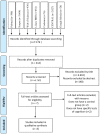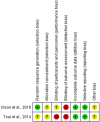The Effects of Moderate Physical Exercise on Adult Cognition: A Systematic Review
- PMID: 29937732
- PMCID: PMC6002532
- DOI: 10.3389/fphys.2018.00667
The Effects of Moderate Physical Exercise on Adult Cognition: A Systematic Review
Abstract
Background: Physical exercise is a systematic sequence of movements executed with a predefined purpose. This muscular activity impacts not only on circulatory adaptations, but also neuronal integration with the potential to influence cognition. The aim of this review was to determine whether the literature supports the idea that physical exercise promotes cognitive benefits in healthy adults. Methods: A systematic search for relevant articles was performed according to the Preferred Reporting Items for Systematic Review and Meta-Analysis criteria using available databases (PubMed, LILACS, Scopus, Web of Science, The Cochrane Library, OpenGrey, Google Scholar and CENTRAL). The search terms included "humans" or "adults" or "cognition" or "awareness" or "cognitive dissonance" or "cognitive reserve" or "comprehension" or "consciousness" and "motor activity" or "exercise" or "physical fitness," and not "aged" or "nervous system diseases," with the purpose of finding associations between moderate physical exercise and cognition. A methodological quality and risk of bias unit assessed the eligibility of articles. Results: A total of 7179 articles were identified. Following review and quality assessment, three articles were identified to fulfill the inclusion criteria. An association between moderate physical exercise and cognition was observed. Improvements in cognitive parameters such as reduced simple reaction time, improved response precision and working memory were identified among the included articles. Conclusion: This systematic review found that moderate physical exercise improves cognition.
Keywords: cognition; moderate physical exercise; physical activity; physical exercise; reaction time.
Figures
References
-
- Atherton N., Bridle C., Brown D., Collins H., Dosanjh S., Griffiths F., et al. . (2016). Dementia and Physical Activity (DAPA)-an exercise intervention to improve cognition in people with mild to moderate dementia: study protocol for a randomized controlled trial. Trials 17:165. 10.1186/s13063-016-1288-2 - DOI - PMC - PubMed
LinkOut - more resources
Full Text Sources
Other Literature Sources



